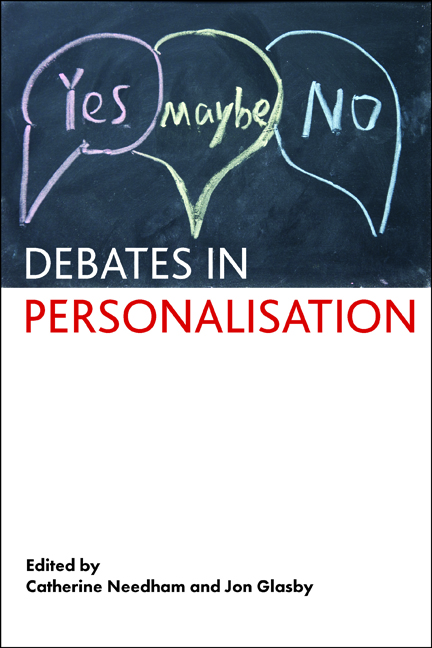Book contents
one - Introduction: debating personalisation
Published online by Cambridge University Press: 04 March 2022
Summary
For anyone working in or receiving adult social care services, the personalisation agenda is of fundamental importance. Different people may love it or loathe it – may be fully supportive, completely opposed and/or just confused – but the shifts in policy and practice that personalisation might imply are potentially far-reaching and certainly hard to ignore. Of all the changes that have taken place in adult social care (and increasingly in other sectors too), it is personalisation that stands out as one of the key themes of the past decade, and quite possibly as one of the key agendas of the next ten years.
Under New Labour, the government's Putting People First concordat pledged to achieve a ‘system-wide transformation’ in which people using services have ‘maximum choice, control and power over the support services they receive’ (DH, 2007, pp 2-3) and in which personal budgets are available ‘for everyone eligible for publicly funded adult social care support other than in circumstances where people require emergency access to provision’. Acknowledging the role of organisations such as In Control (see below) and a number of cutting-edge voluntary organisations and local authorities, the government recognised the importance of local and national leadership to help support and build on ‘the first stage in a unique attempt to co-produce, co-develop and co-evaluate a major public service reform’ (DH, 2007, p 5). Similar sentiments have also been expressed by the coalition government in A vision for adult social care (DH, 2010a, p 15):
Our vision starts with securing the best outcomes for people. People, not service providers or systems, should hold the choice and control about their care. Personal budgets and direct payments are a powerful way to give people control. Care is a uniquely personal service. It supports people at their most vulnerable, and often covers the most intimate and private aspects of their lives. With choice and control, people's dignity and freedom is protected and their quality of life is enhanced. Our vision is to make sure everyone can get the personalised support they deserve.
Building on this, one of seven key principles of A vision for adult social care was ‘personalisation’, described as an approach in which:
Individuals not institutions take control of their care.
- Type
- Chapter
- Information
- Debates in Personalisation , pp. 3 - 10Publisher: Bristol University PressPrint publication year: 2014



